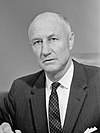Welcome! Check out today's deaths, recent deaths, or our deaths stats.
Feeling experimental? Head on over to our newest (and darkest) feature: Next-2-Die™ predictions
 Thurgood Marshall
Thurgood Marshall


Us supreme court justice from 1967 to 1991.
Born July 2nd, 1908 in Baltimore. [ref]
Died January 24th, 1993 at 84 years old in Bethesda (cardioplegia). [ref]
Thurgood Marshall, an influential figure in American civil rights, died on January 24, 1993 at the age of 84. A pioneering civil rights attorney and the first African American to serve as a justice on the United States Supreme Court, Marshall was an active participant in some of the most momentous civil rights cases of the twentieth century. Most notably, he worked as chief counsel for the Brown v. Board of Education case that abolished racially segregated public schools in the United States. A native of Baltimore, Maryland, Marshall graduated from Lincoln University first in his class in 1930. He then went on to attend Howard University School of Law, and, in 1933, he was admitted to the Maryland bar. In 1936 Marshall founded the NAACP Legal Defense and Education Fund, which he directed and worked with until 1965. During this time he helped to argue and win several landmark court battles, including the 1944 Smith v. Allwright case, which struck down the white primary in Texas, and the University of Maryland Law School admission of Donald Gaines Murray in 1935. Marshall was appointed Solicitor General of the United States in 1965, and in 1967 he was nominated by President Lyndon B. Johnson to the United States Supreme Court, becoming its first African American justice. As Justice, Marshall continued his work, fighting for civil rights and for social justice. His 24-year tenure in the court is remembered for its legacy of rulings that furthered the cause of civil rights and human equality. Marshall is remembered as a great advocate for civil rights, and for leading the way for future generations of civil rights activists. He is looked upon today as one of the most influential figures of the civil rights movement, and his legacy remains an important part of American history.
You might also be interested in...




Death never takes the wise man by surprise, he is always ready to go. Jean de La Fontaine